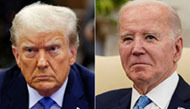If you go into a good library, you will find thousands of books on globalization. Some will laud it. Some will warn about its dangers. But they’ll agree that globalization is the chief process driving our age.
The globalization paradigm has led, in the political arena, to a certain historical narrative: There were once nation-states like the United States and the European powers, whose economies could be secured within borders. But now capital flows freely. Technology has leveled the playing field. Competition is global and fierce.
New dynamos like India and China threaten American dominance thanks to their cheap labor and manipulated currencies. Now, everything is made abroad. American manufacturing is in decline. The rest of the economy is threatened.
Hillary Clinton summarized the narrative recently: “They came for the steel companies and nobody said anything. They came for the auto companies and nobody said anything. They came for the office companies, people who did white-collar service jobs, and no one said anything. And they came for the professional jobs that could be outsourced, and nobody said anything.”
The globalization paradigm has turned out to be very convenient for politicians. It allows them to blame foreigners for economic woes. It allows them to pretend that by rewriting trade deals, they can assuage economic anxiety. It allows them to treat economic and social change as a great mercantilist competition, with various teams competing for global supremacy, and with politicians starring as the commanding generals.
But there’s a problem with the way the globalization paradigm has evolved. It doesn’t really explain most of what is happening in the world.
Globalization is real and important. It’s just not the central force driving economic change. Some Americans have seen their jobs shipped overseas, but global competition has accounted for a small share of job creation and destruction over the past few decades. Capital does indeed flow around the world. But as Pankaj Ghemawat of the Harvard Business School has observed, 90 percent of fixed investment around the world is domestic. Companies open plants overseas, but that’s mainly so their production facilities can be close to local markets.
Nor is the globalization paradigm even accurate when applied to manufacturing. Instead of fleeing to Asia, United States manufacturing output is up over recent decades. As Thomas Duesterberg of Manufacturers Alliance/MAPI, a research firm, has pointed out, the United States’s share of global manufacturing output has actually increased slightly since 1980.
The chief force reshaping manufacturing is technological change . Thanks to innovation, manufacturing productivity has doubled over two decades. Employers now require fewer but more highly skilled workers. Technological change affects China just as it does the America. William Overholt of the RAND Corporation has noted that between 1994 and 2004 the Chinese shed 25 million manufacturing jobs, 10 times more than the United States.
The central process driving this is not globalization. It’s the skills revolution. We’re moving into a more demanding cognitive age. In order to thrive, people are compelled to become better at absorbing, processing and combining information.
The globalization paradigm emphasizes the fact that information can now travel 24,000 kilometers in an instant. But the most important part of information’s journey is the last few centimeters - the space between a person’s eyes or ears and the various regions of the brain. Does the individual have the capacity to understand the information- Does he or she have the training to exploit it- Are there cultural assumptions that distort the way it is perceived?
The globalization paradigm leads people to see economic development as a form of foreign policy, as a grand competition between nations and civilizations. These abstractions, called “the Chinese” or “the Indians,” are doing this or that. But the cognitive age paradigm emphasizes psychology, culture and pedagogy - the specific processes that foster learning. It emphasizes that different societies are being stressed in similar ways by increased demands on human capital. If you understand that you are living at the beginning of a cognitive age, you’re focusing on the real source of prosperity and understand that your anxiety is not being caused by a foreigner.
It’s not that globalization and the skills revolution are contradictory processes. But which paradigm you embrace determines which facts and remedies you emphasize. Politicians, especially Democratic ones, have fallen in love with the globalization paradigm. It’s time to move beyond it.
스마터리빙
more [ 건강]
[ 건강]이제 혈관 건강도 챙기자!
[현대해운]우리 눈에 보이지 않기 때문에 혈관 건강을 챙기는 것은 결코 쉽지 않은데요. 여러분은 혈관 건강을 유지하기 위해 어떤 노력을 하시나요?
 [ 건강]
[ 건강]내 몸이 건강해지는 과일궁합
 [ 라이프]
[ 라이프]벌레야 물럿거라! 천연 해충제 만들기
 [ 건강]
[ 건강]혈압 낮추는데 좋은 식품
[현대해운]혈관 건강은 주로 노화가 진행되면서 지켜야 할 문제라고 인식되어 왔습니다. 최근 생활 패턴과 식생활의 변화로 혈관의 노화 진행이 빨라지고
사람·사람들
more많이 본 기사
- 트럼프와 여성들 함께 찍힌 ‘엡스타인 사진’ 공개
- 비극 속 시민의 용기 총격범 맨손 제압
- 지구촌 또 ‘총기 난사’… 미·호주 잇단 참사
- 인니 수마트라섬 ‘대홍수’
- ‘김민재 점점 독일 국대에 밀린다’ 독일 현지, 타 향해 연일 찬사... “뮌헨 최고의 영입, 진정한 수비 리더”
- ‘박성광♥’ 이솔이, 암 투병 중 안타까운 소식 “병원 몇 번 가는 건지..내 탓”
- 19개주, 전문직 비자 ‘10만불 수수료’ 소송
- 변요한♥티파니, 약지에 ‘커플링·포르쉐’..열애 中 티냈다
- 테슬라 11월 미국 판매… 4년만에 최저
- “마두로는 마약조직 총책”… 트럼프 속내는 석유 확보?
- 뉴욕 백화점서 아기 기저귀 갈던 엄마, 정신질환자에 흉기피습
- “차세대와 함께 한국 문화 널리 알릴 터”
- “걱정했잖아” 윤정수, 비 그친 발리서 ♥원진서와 신혼여행 만끽
- 정우성 “현빈과 텐션 점점 무르익어”…사생활 변화엔 “말씀 못 드려”
- 시드니 유대인 총기참사 용의자는 50세 아버지·24세 아들
- 관세가 끌어올린 물가… 가구당 1,200달러 추가 지출
- 박나래 ‘링거이모’, 진짜 ‘無면허’였다 “박나래 알지만 전혀 기억 안 나”
- 재정보조 테크닉보다 타이밍의 중요성
- 팝핀현준, 수업 중 발언 논란에 교수직 사임… “진심으로 사과”
- 항공기 승객정보 활용 추방 확대
- “성과는 있었지만 아직 끝 아냐”
- 아이비리그 합격 가르는 것은 ‘스펙’ 아닌 ‘습관’
- 백악관 연회장 신축 저지 소송 국가역사보존단체, 연방지법에
- 오늘의 베네수엘라가 내일의 동아시아국가…
- [경제 트렌드] 외식비 줄이는 소비자… ‘팁 공포’ 한몫
- 오늘 추첨 파워볼 잭팟 11억달러로 ‘껑충’
- [조지 F. 윌 칼럼] 대통령의 전쟁수행권
- “스마트폰 달고 사는 당신, 안구건조증 주의하세요!”
- 총격 상처 피해 진학한 대학서 또 총기난사… “엄청난 타격”
- 총격 상처 피해 진학한 대학서 또 총기난사… “엄청난 타격”
- [만화경] ‘뒷마당’ 찾겠다는 트럼프식 먼로주의
- 투고(To Go) 해야 하나?
- 연말 DUI 집중 단속 무관용 강력 처벌
- 퇴조의 핑크 타이드
- 호주 총격범 제압 시민 영웅은 43세 과일가게 주인 아흐메드 씨
- 미, 베네수엘라 지상전 위협… 쿠바까지 흔들기
- 모두가 원하는 물가 하락… 반드시 긍정적이지 않아
- 통계로 본 올해 대한항공… ‘캡틴 아메리카’ 가장 많이 보고, 최다 방문지 도쿄
- “트럼프, 바이든 데자뷔인줄” 취임 1년새 고령 논란·지지율 뚝
- 미 무역적자, 5년여 만에 최저
- 중국 ‘여행자제령’ 직격탄 맞은 일본
- [이민법 칼럼] 더 힘들어진 취업이민 1순위
- Engineering Hope When the World Pushes Back
- 연방법원, 킬마르 석방 “적법한 추방 명령 없어”
- 중, 난징대학살 추도… ‘일본군 해골 베는 포스터’도
- 연은 총재 전원 재임명 연준, 만장일치 표결
- From Regret to Growth: A Morning of Reflection
- 트럼프, 새 연준의장 ‘2파전’ 시사
- 남가주 한인공인회계사협회, 송년모임 개최
- 존 이 시의원, 선물 수수 ‘윤리 위반’
1/5지식톡

-
 테슬라 자동차 시트커버 장착
0
테슬라 자동차 시트커버 장착
0테슬라 시트커버, 사놓고 아직 못 씌우셨죠?장착이 생각보다 쉽지 않습니다.20년 경력 전문가에게 맡기세요 — 깔끔하고 딱 맞게 장착해드립니다!장착비용:앞좌석: $40뒷좌석: $60앞·뒷좌석 …
-
 식당용 부탄가스
0
식당용 부탄가스
0식당용 부탄가스 홀세일 합니다 로스앤젤레스 다운타운 픽업 가능 안녕 하세요?강아지 & 고양이 모든 애완동물 / 반려동물 식품 & 모든 애완동물/반려동물 관련 제품들 전문적으로 홀세일/취급하는 회사 입니다 100% …
-
 ACSL 국제 컴퓨터 과학 대회, …
0
ACSL 국제 컴퓨터 과학 대회, …
0웹사이트 : www.eduspot.co.kr 카카오톡 상담하기 : https://pf.kakao.com/_BEQWxb블로그 : https://blog.naver.com/eduspotmain안녕하세요, 에듀스팟입니다…
-
 바디프렌드 안마의자 창고 리퍼브 세…
0
바디프렌드 안마의자 창고 리퍼브 세…
0거의 새제품급 리퍼브 안마의자 대방출 한다고 합니다!8월 23일(토)…24일(일) 단 이틀!특가 판매가Famille: $500 ~ $1,000Falcon: $1,500 ~ $2,500픽업 & 배송직접 픽업 가능LA…
-
 바디프렌드 안마의자 창고 리퍼브 세…
0
바디프렌드 안마의자 창고 리퍼브 세…
0거의 새제품급 리퍼브 안마의자 대방출 한다고 합니다!8월 23일(토)…24일(일) 단 이틀!특가 판매가Famille: $500 ~ $1,000Falcon: $1,500 ~ $2,500픽업 & 배송직접 픽업 가능LA…
케이타운 1번가
오피니언
 옥세철 논설위원
옥세철 논설위원오늘의 베네수엘라가 내일의 동아시아국가…

퇴조의 핑크 타이드
 조지 F·윌 워싱턴포스트 칼럼니스트
조지 F·윌 워싱턴포스트 칼럼니스트 [조지 F. 윌 칼럼] 대통령의 전쟁수행권
 조옥규 수필가
조옥규 수필가 투고(To Go) 해야 하나?
 신경립 / 서울경제
신경립 / 서울경제 [만화경] ‘뒷마당’ 찾겠다는 트럼프식 먼로주의

22기 LA평통 출범에 거는 기대

연말 시즌 사기·범죄 경계해야
 메건 매카들 워싱턴포스트 칼럼니스트
메건 매카들 워싱턴포스트 칼럼니스트 [메건 매카들 칼럼] 장편영화의 마지막 챕터인가
 김미선 서북미문인협회 회장시인
김미선 서북미문인협회 회장시인 [한국춘추] 하늘을 계산한 사람들, 칠정산
1/3지사별 뉴스

“마약밀매·인신매매 등 국제범죄 척결” ‘국토안보 태스크포스’ 뉴욕지부 출범
연방 국토안보부가 10일 ‘국토안보 태스크포스’(HSTF) 뉴욕지부를 출범시켰다.HSTF는 마약 카르텔, 인신매매, 자금세탁, 갱단 등 국제범…
‘오바마케어 보조금’ 올해 말 종료 가능성 ↑ 커져

한국 교사 10명, 페어팩스 초등교 배치
‘글로벌 앰버서더 티처스 프로그램’(Global Ambassador Teachers Program)은 국제 교사 교환 프로그램 가운데 하나로 …
김찬수씨, 포토맥 포럼에 2천달러 기부

총격 상처 피해 진학한 대학서 또 총기난사… “엄청난 타격”
고교 총격 사건 생존자인 미아 트레타가 브라운대 총격 사건 이후 인터뷰하는 모습. [로이터]동부 브라운대에서 총격 사건으로 10여명의 사상자가…
내년 중간선거 낙관못하는 트럼프… “경제성과 전달에 시간 걸려”

오늘 하루 이 창 열지 않음 닫기 





















































.png)


댓글 안에 당신의 성숙함도 담아 주세요.
'오늘의 한마디'는 기사에 대하여 자신의 생각을 말하고 남의 생각을 들으며 서로 다양한 의견을 나누는 공간입니다. 그러나 간혹 불건전한 내용을 올리시는 분들이 계셔서 건전한 인터넷문화 정착을 위해 아래와 같은 운영원칙을 적용합니다.
자체 모니터링을 통해 아래에 해당하는 내용이 포함된 댓글이 발견되면 예고없이 삭제 조치를 하겠습니다.
불건전한 댓글을 올리거나, 이름에 비속어 및 상대방의 불쾌감을 주는 단어를 사용, 유명인 또는 특정 일반인을 사칭하는 경우 이용에 대한 차단 제재를 받을 수 있습니다. 차단될 경우, 일주일간 댓글을 달수 없게 됩니다.
명예훼손, 개인정보 유출, 욕설 등 법률에 위반되는 댓글은 관계 법령에 의거 민형사상 처벌을 받을 수 있으니 이용에 주의를 부탁드립니다.
Close
x